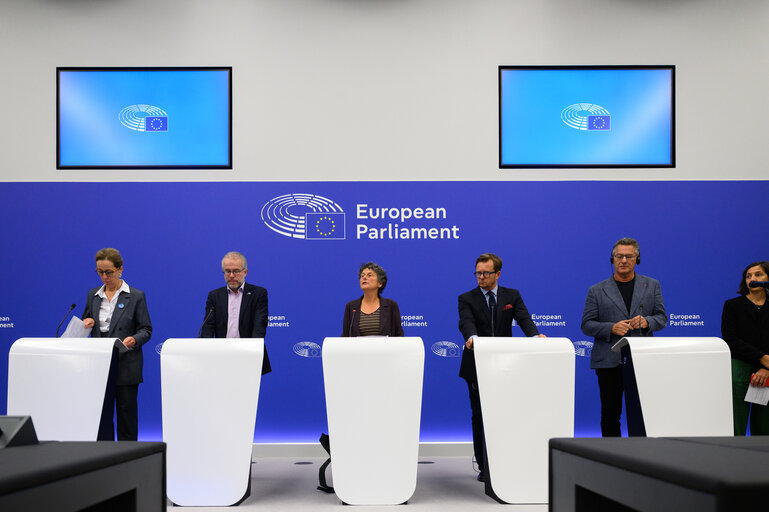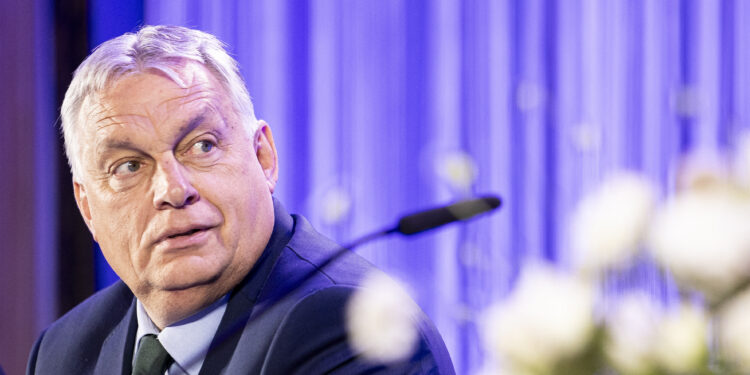From the correspondent in Strasbourg – Viktor Orban is in the spotlight of controversy. The presentation of the priorities of the EU Council presidency is scheduled for tomorrow, October 9, and the European left is not caught unprepared.
“We are ready to confront Orban on what he and his government will do during the Hungarian EU presidency,” said MEP Manfred Weber, chairman of the EPP Group. At the press conference, comparing the last Hungarian presidency in 2011 and this incoming one, Weber added, “Today we are witnessing a great failure” for the Hungarian government, especially in external missions to protect peace and European values.
“Every presidency works for the prosperity of our Union and our core values,” said Iratxe Garcia Perez, president of the Socialists and Democrats (S&D). “Orban represents all the opposite.” Garcia Perez emphasized the rampant corruption in Hungary and the negative impact of Orban’s government on the civilian population, which should be distinguished from his presidency and with which S&D stands in solidarity. The head of the Hungarian delegation in S&D, Klara Dobrev, intensified the remarks, emphasizing the difficulties of Orban government in running the country. According to Dobrev, Orban “is not the president of the Union, has not been, and will never be.”
As president of Renew Europe, Valerie Hayer begins by saying, “We will not make it possible for Orban, on the occasion of this presentation, to put on a show,” referring to tomorrow’s meeting. According to Hayer, Orban mystifies reality. Hungary’s problem is internal mismanagement, and “Orban is trying to create diversions to divert attention from his own failed internal affairs,” to which the Renew group seems intent on giving no consideration.
The now La Sinistra MEP Ilaria Salis directly experienced the action of the Orban regime. Salis recounted the 15-month pre-trial detention in Hungary, of which she “already widely reported conditions.” President Orban has identified his nemesis in Salis, describing her on a visit to Italy “as a criminal” (despite no judgment against her). However, the media chaos created by the Italian activist’s arbitrary detention did not stop the Orban regime. Currently undergoing the same experience is a German activist, Maya T., subjected to detention (without a date for a trial), whose arrest and conditions of detention Salis described as “absolutely contrary to European standards.” Concluded Salis: “It is a paradox that the presidency can touch someone who publicly says he wants to occupy Brussels and wants to dismantle the European Union and its values in the name of a new nationalism.”

Equally concerning is the condition of the rule of law in Hungary.
Green MEP Tineke Strik, as the rule of law rapporteur, wanted to clarify how difficult the Hungarian situation was and how evident this has been in her work on the ground. “The situation on the rule of law has only worsened” in Hungary. The gradual repression of all forms of opposition, including the media, is evident in the country. “Hungary is one of the most corrupt countries in the EU,” Strik recalls, and Orban does not seem to want to admit the obvious critical issues the country is facing.
“The EU must protect Hungarians from these authoritarian drifts,” added Polish MEP Michał Wawrykiewicz of the EPP. He recalled that Hungary, as a member of the EU, must comply with treaty obligations, such as maintaining the rule of law.
“We are not talking about political differences or a political party winning or losing elections. Here, European values are at stake,” said Thijs Reuten of the S&D group. The Hungarian premier’s agenda goes against European values, and Orban wants to destabilize the EU from within. Reuten expressed his rage at “the 26 member states, who are letting this happen” without using all the means at their disposal.
These are “pogroms” against Hungarian journalists, according to Konstantinos Arvanitis, MEP for the Left. Equally important are the attacks against the Lgbtq+ community and the loss of autonomy of the country’s judiciary. “We have to manage dangerous far-right populism that goes to undermine our democracy,” Arvanitis recalls.
Fabienne Keller spoke for Renew, confirming the commitment to defending “something very precious to Europe: the rule of law.” Keller reiterated full solidarity with the people of Hungary experiencing democratic deterioration and firmness in opposing the Orban government. “If Hungary were a candidate to join the Union, it would not meet the criteria,” Keller said.
This description is emblematic of the contradiction between a country that finds itself presiding over the Council of the European Union and the domestic condition that is moving increasingly toward authoritarianism. The controversy of the European Left will clash with Orban, who already today is busy previewing to the press what he wants to do in his term.
English version by the Translation Service of Withub





![Una donna controlla le informazioni sul cibo specificate sulla confezione [foto: archivio]](https://www.eunews.it/wp-content/uploads/2014/12/Etichette-alimentari.jpg)

